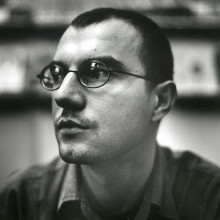Polish literature

Daniel Odija
b. 1974, prose writer; made his debut with a collection of short stories entitled "Travels on the Spot" (2000), and then published the novels The Street (2001) and The Sawmill (2003), as well as a collection of short stories called The Glassed Works (2005); a theater production based on The Sawmill has been directed by Agnieszka Olsten; he has been nominated for the NIKE Literary Award; he lives in Słupsk.
Like many prose-writers born in the 70s, Daniel Odija was caught up in the wave of interest in what was known as ‘political prose,’ whereby authors showed the social consequences of the political-economic changes happening in Poland. His prose depicts – to use the expression of another young writer, Ignacy Karpowicz – "Class-B Poland, i.e. trash" and the hardships of the residents of post-communist small towns and villages. The bravura "Street" introduces readers to the micro-world of people living on Długa Street, in a lousy district of a provincial town: alcoholics, petty criminals, madmen, and various drifters whose families have been stuck in a ghetto of poverty and hopelessness for generations, without the slightest chance of getting out of it. Odija writes: "Długa is one of those streets you find everywhere in small towns". The action of The Sawmill takes place in an impoverished, post-communist village, and its main protagonist is Myśliwski, a rich man and the owner of the local sawmill. But he experiences his own failure, because the evil causing it comes back to get him twice over, neutralizing all his efforts and attempts. A similar subject matter appears in the stories found in "The Glassed Works", in which Odija depicts protagonists dealing with everyday problems, trying to give their existence some kind of meaning.
Odija does not limit himself, however, to painting precise pictures, which are often even meticulous in their description, and describing the specifics of our "here and now". His texts time and again break realistic conventions, aiming for universality or even allegory, which is signalized by the above-quoted passage from The Street. Thus these stories about everyday concerns and problems turn into stories about the passing of time and how one reconciles oneself to it, of the eternal cycle of birth and death, and the struggle between good and evil; and these precise descriptions of the present are saturated with a fleeting poetry.
BIBLIOGRAPHY
- Podróże w miejscu, ZLP, Słupsk 2000.
- Ulica, Wydawnictwo Czarne, Wołowiec 2001.
- Tartak, Wydawnictwo Czarne, Wołowiec 2003.
- Szklana huta, Wydawnictwo Czarne i Prószyński i S-ka, Wołowiec-Warszawa 2005.
- Niech to nie będzie sen, Wydawnictwo Literackie, Kraków 2008.
- Kronika umarłych, W.A.B., Warszawa 2010.
TRANSLATIONS
German:
- Das Sagewerk [Tartak], trans. Martin Pollack, Wiedeń: Zsolnay, 2006
Auf offener Straße [Ulica], trans. Martin Pollack, Wiedeń: Paul Zsolnay Verlag, 2012
Ukrainian:
Tartak, trans. Oleksandra Bojczenka, Czerniowce: Knigi XXI, 2008